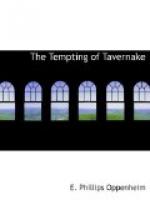“And did you find him?” he asked, hailing a cab.
“Yes, I found him,” she answered, indifferently. “We went through the usual programme. He heard me sing, tried to kiss me and promised to let me know. Nobody ever refuses anything in my profession, you see. They promise to let you know.”
“Are you a singer, then, or an actress?”
“I am neither,” she told him. “I said ‘my profession’ because it is the only one to which I have ever tried to belong. I have never succeeded in obtaining an engagement in this country. I do not suppose that even if I had persevered I should ever have had one.”
“You have given up the idea, then,” he remarked.
“I have given it up,” she admitted, a little curtly. “Please do not think, because I am allowing you to be my companion for a short time, that you may ask me questions. How fast these taxies go!”
They drew up at their destination—a well-known restaurant in Regent Street. He paid the cabman and they descended a flight of stairs into the grill-room.
“I hope that this place will suit you,” he said. “I have not much experience of restaurants.”
She looked around and nodded.
“Yes,” she replied, “I think that it will do.”
She was very shabbily dressed, and he, although his appearance was by no means ordinary, was certainly not of the type which inspires immediate respect in even the grill-room of a fashionable restaurant. Nevertheless, they received prompt and almost ofcious service. Tavernake, as he watched his companion’s air, her manner of seating herself and accepting the attentions of the head waiter, felt that nameless impulse which was responsible for his having followed her from Blenheim House and which he could only call curiosity, becoming stronger. An exceedingly matter-of-fact person, he was also by instinct and habit observant. He never doubted but that she belonged to a class of society from which the guests at the boarding-house where they had both lived were seldom recruited, and of which he himself knew little. He was not in the least a snob, this young man, but he found the fact interesting. Life with him was already very much the same as a ledger account—a matter of debits and credits, and he had never failed to include among the latter that curious gift of breeding for which he himself, denied it by heritage, had somehow substituted a complete and exceedingly rare naturalness.
“I should like,” she announced, laying down the carte, “a fried sole, some cutlets, an ice, and black coffee.”
The waiter bowed.
“And for Monsieur?”
Tavernake glanced at his watch; it was already ten o’clock.
“I will take the same,” he declared.
“And to drink?”
She seemed indifferent.
“Any light wine,” she answered, carelessly, “white or red.”
Tavernake took up the wine list and ordered sauterne. They were left alone in their corner for a few minutes, almost the only occupants of the place.




